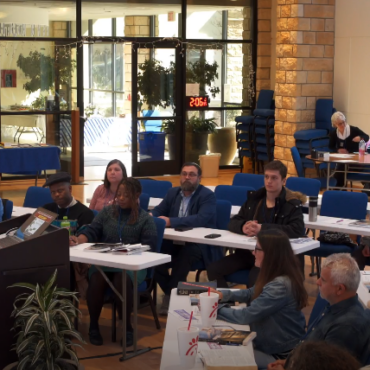Opportunities in Disguise

By Sam Nadler
There are times that for His own reasons, God may allow sickness, discomfort, or hardship to impact our lives. In such trials, the tendency is to focus our attention inward to the point that we can become oblivious to the needs of people around us. In the following verse, we see that rather than healing him, God used sickness in Paul’s life as an advantage to reach people who may otherwise never have heard the Good News: “But you know that it was because of a bodily illness that I preached the Good News to you the first time” (Gal. 4:13). In his letter to the Galatians, Paul is teaching that salvation (ch. 1-3) and sanctification (ch. 4-6) are both a matter of grace through faith in Messiah. Grace is neither dependent on my strength nor hindered by my weakness. To the contrary, God is able to use our problems as a conduit of His grace, and make us “more than conquerors” through Messiah who loves us (Rom. 8:35-37).
Keeping your Focus
Paul suffered much. Among his many trials, one of his most perplexing situations was when he prayed three times for deliverance from affliction and God said “no” (2 Cor. 12:8,9). Paul likely suffered (among other things) from an eye disease common at that time and place in history. It was an unsightly condition, as excessive mucus would accumulate around the eyes, which would have made it difficult for others to look at Paul as he taught about Messiah (Gal. 4:14,15). At the very least, it would be embarrassing to appear like this. Despite the problem with his eyes, Paul kept his focus clear.
A Lasting Impression
There’s never a second chance to make a first impression. Surprisingly, Paul’s first impression that he made upon the Galatians was not his rabbinical training, his Jewish pedigree, nor his illustrious acquaintances— (Peter, James and John). The Galatians’ first impression of Paul was that of a messenger of the Good News, preached because of bodily illness. In a sense, Paul was saying, ‘My life is not about my health, but about the new life we have in the Good News of Messiah. Everything else you may learn about me will be in the context of the purpose of my
life: the message of Messiah.’ For us today, we can say with Paul, ‘It’s not about doctors who may foul up the works, insurance companies that won’t pay off, diseases that humiliate and debilitate us. Our focus, like Paul’s, should be God’s purpose for our lives in light of the Good News.
Purpose in Suffering
Sickness is not, in and of itself, a help to anyone. However, illness can provide the opportunity to share that which can really help all people: the Good News of Messiah! The Bible speaks of four causes of illness, bodily affliction, or sickness: Natural causes (Lev. 15:33; Mk. 1:30; 1Tim. 5:23). Just living in a corrupt and contagious world will suffice. Demonic causes (Job 2:7; Lk. 13:11); Sinful causes (2 Sam. 13:2; Jn. 5:14; 1 Cor. 11:29, 30); God-ordained causes (Ex. 4:11; Jn. 9:4,5). The most faithful or faithless people can catch a common cold, or the flu, but for the believer, the circumstance becomes the conduit of God’s grace—no matter how painful or grievous. There is a definite purpose to our lives as we yield ourselves to God. But, won’t people think less of the Good News when you are in weakness? (e.g., “If God is so good, why are you sick?”)
A Passport to Ministry
Your sickness may be your ‘passport to ministry’. I once knew a Jewish couple who had real family problems, but they assumed I could never identify with their issues. When I came under bodily affliction, they saw that I knew about misery as well and felt that I could, in fact, identify with them without being condescending. My problems, afflictions and frailty actually became my passport into their lives. This was a turning point in my ministry to, and friendship with them. I could now share the hope and help available to us in Messiah, more effectively.
We must remember, it was through the wretched cross of our Messiah that all Good News has come to us. His power is made perfect through weakness, proving His grace is our sufficiency. Therefore, the very cross we bear—health problems, relationship crisis, financial disasters—can also be God’s instrument of grace to share the message of life with others. Although there are many different spiritual purposes for problems (see Ps. 119:67, 71, 75), sharing hope in Messiah has to be at the top of the list. For people without the Lord, when their circumstances fall apart, they fall apart. But, if you know the Lord, you know One Greater than your problems, One whose grace is your sufficiency.
A Case in Point
Several years ago, I had to see a doctor every month for a check-up. This doctor was so impersonal and indifferent, it became painful even to talk to him. He wouldn’t even lift his eyes to acknowledge my presence, just a few quick questions and “you may leave.” After a while, I didn’t even bother entering the room, let alone sit down. I just stood in the doorway,
answered the questions and left. Finally, after five months he asked, “So, how long have you been involved in this?” “Involved in what?” I replied. “This Jesus thing,” he impatiently responded. “Do you really want to know?” I asked. Finally, looking up at me, “Yes I do,” he said quietly. So, I sat down and shared my story as to how I came to believe in Yeshua. He asked for literature—his eyes asked for prayer. This Jewish doctor was filled with pain because his schizophrenic son had made his life a misery. I told him I would pray; he said he would read the literature. By the grace of God, through my own affliction, the Lord allowed me to offer the hope we have in Yeshua.
From Opportunities to Importunities
Many times we encounter a disguised opportunity when we seem least inclined to be spiritual. *Jacob was to follow-up on an interested Jewish couple, but he was too tired, it was too far, he didn’t think it was worth his time. That said, it was still his responsibility, so begrudgingly he went. *Jerry and *Esther both came to faith, grew strong in the Lord and are, today, Jacob’s best friends. God’s opportunities come disguised as ‘importunities’ so that by faith alone, we might enjoy the blessing and all glory might go to God.
God’s Grace is Sufficient
Just as the Good News is not dependent on good works, so it is not hindered by miserable trials. Why do ‘bad things happen to good people?’ In order to share the Good News with others. What do we do in bad times? Share Good News. Even in his “prison ministry” Paul knew he was there for a purpose—God’s purpose! “Now I want you to know, brethren,
that my circumstances have turned out for the greater progress of the gospel, so that my imprisonment in the cause of Messiah has become well known throughout the whole praetorian guard and to everyone else, and that most of the brethren, trusting in the Lord because of my imprisonment, have far more courage to speak the word of God without fear” (Phil 1:12-14). This was Paul’s point: When the Good News came to the Galatians, it was not dependent on his own works, since God brought it to them through Paul’s frailty.
So, when life doesn’t work out according to your own will, remember that God is still working out His will for you in Messiah and that’s the very best any of us could hope for!
*names have been changed to protect individual’s privacy




Add Comment